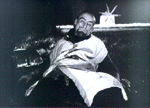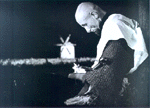
| Péter Sneé | The Golden Bird |

|
István Szaladják’s debuting film
 István Szaladják 30 Kbyte |
What makes a 30-year-old film-maker (who is considered to be young and inexperienced in Hungarianfilm industry) recall and redefine the knightly ideals of the Middle Ages in honour of the first great poet of the Minnesang? Over a decade ago, when the lecturers at the Hungarian universities first pointed out the change in the younger generation’s way of thinking, only perhaps political managers tossed their heads on hearing the news. Nevertheless, the change of interest modified the teaching of philosophy, where the so far excluded methods finally gained ground, so our stock of concepts to be used for individual interpretations of the world significantly expanded. Nothing is in the way of expressing different mystical and esoteric ideas any more. By knocking down the last of the ideological prohibitions, the freedom of depiction became absolute, while the trends of the era also encouraged our artists to make use of the opportunity. The urge is especially strong in the field of moving image. The unbelieveable growth of our technical possibilities tempt us to step beyond the limits of the unimaginative reality, while the emerging cyberspace and the ruling of the ideas of virtual reality encourage us to "emigrate" into the world of fantasy. We can escape into different directions in lots of ways. We cannot even exclude that our trip taken beyond the empirical existence is only a delusion. We arbitrarily suspend time and sponge in the spiritual space that lacks signposts to look for our undefinable answers to the ancient questions, hiding behind the player’s mask. Just the way Griffith preaches in the stories of Impatience, the way Bergman moralises in The Seventh Seal , or how Ildikó Enyedi plays in the tale of the Magic Hunter (Bűvös vadász). István Szaladják’s 30-minute short film also follows this less fashionable model which is difficult to conceive, and puts both the film-maker and the viewer to the test. The hero of The Golden Bird is the Knight of Kürenberg, of whom there are very few records remained, apart from the well-known fact that he lived at the end of the 1100es around Linz. Only few of his songs survived, from among which the most famous, Ich zoch mit einen Valken created a competition among the literary translators of our times. Szaladják based his script on Radnóti’s interpretation, to which he also adds contemporary quotations to emphasise the interpretational frame of the poem which is so rich in love symbols, and guides us back to the philosophical content of poetry. He also takes care of the evocative power of this poetry. In Tibor Szemző’s narration these noble texts really sound like the summary of meditative contemplations defined in internal speech, while in the meantime they manage to preserve their melody. When talking about the film, it is the first thing for me to mention and not at all by accident, since Szaladják’s greatest merit is the highlighting of the text and the story. He breaks a decade-long tradition by giving back diminished notional concepts their own right again. His hero is a cavallier-poet who writes poetry and wanders about to supporteverybody in need of help. Yet, it is all but illusion; the romantic knight of Kürenberg completely and utterly identifies himself with his spiritual aims and submit everything to them. He is looking for death, since during his brooding, he came to the conclusion that the aim of knightly life can be nothing else but to reach the "other" side of the river. This peculiar theory of knowledge and existencialism is an amazing example for the inverse way of thinking (in which birth is the loss of the substance, while death is finding it again), and as such, it is unexpected and surprising for us, while its consistency is stunning. In amazement, we are looking at the way of thinking, so far only little known to us, and we fascinatingly give in to its soothing charm. We regard this spiritual construction as a work of art and praise its beauty instead of its truth. We have no intention to control or criticise it, so what we see here is a rather surprising phenomenon: the originally philosophical element of a work of art reigning as an aesthetic element. It reigns in the literal meaning of the word, it emerges to be a central organising force, submitting all the rest. The unisonous and ever depressing monotony originates from here. The greatest virtue and mistake of The Golden Bird stems from the same source, from the exaggerated coherence. Life becomes peripheral, colours are fading. István Szaladják could hardly have chosen a material for the film other than black-and-white. Where the hero is only a silent "walk-on actor", the enemies or those in need of help sink into insignificance. The film lacks conflict and also the opportunity for actors to play. Pál Deim, who portrays the knight of Kürenberg, can offer only his characteristic face, but we learn about the processes going on in his soul in the quest for death, how he finds it and accepts it only through narration. The film approaches the boundaries of a radio play, and only the visual imagination of the director, and the creative work of the photographer prevent the film from falling into moving-image illustrations or self-satisfied etudes. Instead of seeing the substance, colourfulness is the trend today, so we understand why the director decides on the extreme opposite, against the ruling traditions, and reduces its task and the plot of his work to deal with a single basic question. This limitation has serious consequences on the composition. Since if it is absolutely submitted to the message, external aspects, for instance, the length required by the distributor,cannot influence it. István Szaladják does not show sufficient strength or is unable to find the appropriate coda, since he prolongs the ending. Some minor deficiencies can also be traced: the important leading motif, which serves as a background, the starting of the windmill, for example, takes place at a dramaturgically disputable moment, the make-up of the hero is ineffectual, while following the shot arrow by mounting technique seems to be the awkward repetition of an old idea (although, the same works excellently when the trombones of the Last Judgement appear). Despite the facts mentioned above, The Golden Bird is one of the most promising creations of recent years. Its atmosphere is strong, the mood is captivating, and the film can be the exemplary preparation of a successful future career.
|  30 Kbyte
|  33 Kbyte |